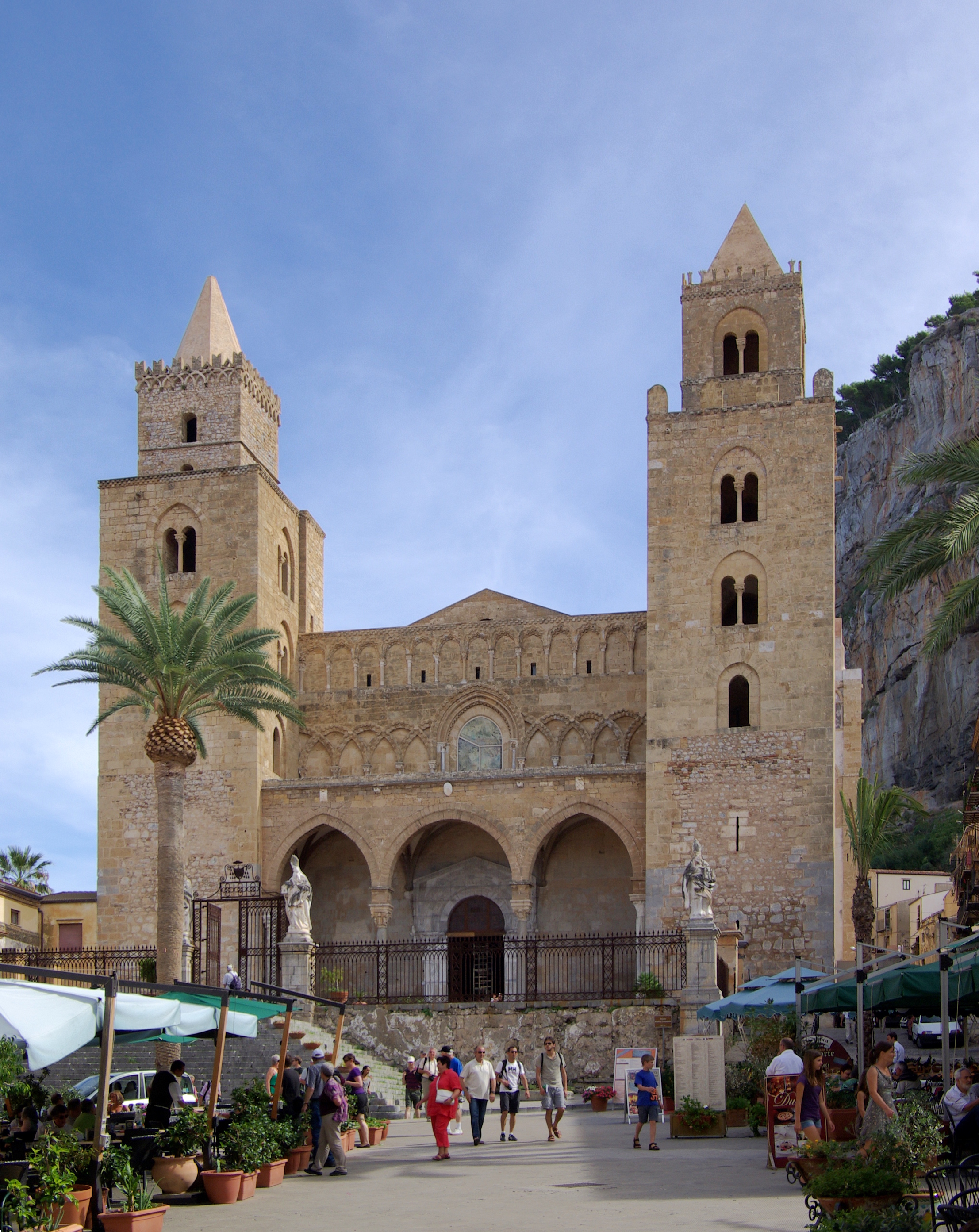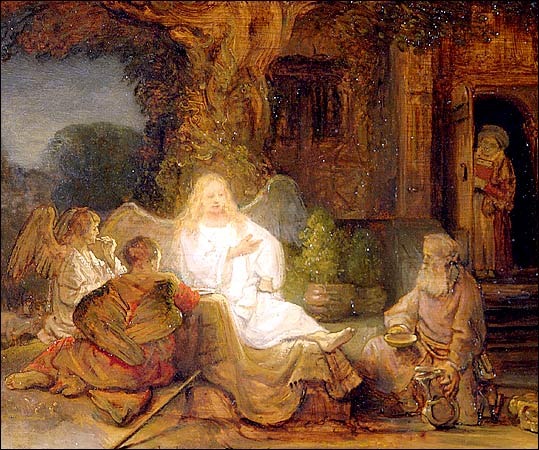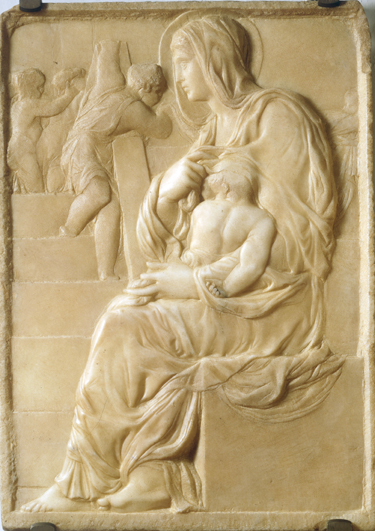|
Antonio Del Duca
Antonio del Duca or Lo Duca (Cefalù 1491 – Rome 1564) was the Sicilian friar whose persistent campaign for an official veneration of the "Seven Angelic Princes" was partly answered in the dedication of Santa Maria degli Angeli e dei Martiri, constructed to the orders of Pope Pius IV within the ruins of the Baths of Diocletian. Life Antonio had been obsessed with the cult of the angels since the days when he was choirmaster in the cathedral of Palermo, 1513-15. At that time he discovered in the little Church of Sant'Angelo an ancient icon of the Seven Angelic Princes that emerged almost by a miracle after centuries of neglect. Fired with his faith, he traveled to Rome, harboring the intention of obtaining formal recognition of these ''Sette Principi angelici''. In Rome he obtained a post as chaplain to Antonio Maria Cardinal Ciocchi del Monte, uncle of the future Pope Julius III. For the cardinal he composed a liturgy for a Mass of the Seven Angels. After his patron's death in 1 ... [...More Info...] [...Related Items...] OR: [Wikipedia] [Google] [Baidu] |
Cefalù
Cefalù (), classically known as Cephaloedium (), is a city and comune in the Italian Metropolitan City of Palermo, located on the Tyrrhenian coast of Sicily about east of the provincial capital and west of Messina. The town, with its population of just under 14,000, is one of the major tourist attractions in the region. Despite its size, every year it attracts millions of tourists from all parts of Sicily and also, from all over Italy and Europe. Names The city's Sicilian name is . It was named by the Greeks who called it ''Kephaloídion'' () or ''Kephaloidís'' (). These were latinised as ''Cephaloedium'' and ''Cephaloedis''. Under Arab rule, it was known as ''Gafludi''. Under Carthaginian rule, it was known as "Cape Melqart" ( xpu, 𐤓𐤔 𐤌𐤋𐤒𐤓𐤕, ), after the Tyrian god. History Of Siculian foundation, in the fourth century BC the Greeks gave the indigenous settlement the name of ''Kephaloídion'', evidently derived from its situation on a lofty and p ... [...More Info...] [...Related Items...] OR: [Wikipedia] [Google] [Baidu] |
Archangel Raphael
Raphael (, "God has healed"), ''Rəfāʾēl'', Tiberian: ''Răp̄āʾēl''; lit. 'God has healed'; grc, Ραφαήλ, ''Raphaḗl''; cop, ⲣⲁⲫⲁⲏⲗ, ''Rafaêl''; ar, رافائيل, ''Rāfā’īl'', or , ''Isrāfīl''; am, ሩፋኤል, ''Rufaʾel''. is an archangel first mentioned in the Book of Tobit and in 1 Enoch, both estimated to date from between the 3rd and 2nd century BCE. In later Jewish tradition, he became identified as one of the three heavenly visitors entertained by Abraham at the Oak of Mamre. He is not named in either the New Testament or the Quran, but later Christian tradition identified him with healing and as the angel who stirred waters in the Pool of Bethesda in John 5:2–4, and in Islam, where his name is Israfil, he is understood to be the unnamed angel of Quran 6:73, standing eternally with a trumpet to his lips, ready to announce the Day of Judgment. In Gnostic tradition, Raphael is represented on the Ophite Diagram. Origins in post-e ... [...More Info...] [...Related Items...] OR: [Wikipedia] [Google] [Baidu] |
1491 Births
Year 1491 ( MCDXCI) was a common year starting on Saturday (link will display the full calendar) of the Julian calendar. Events January–December * January 2 – Alain I of Albret signs the Treaty of Moulins with Charles VIII of France. * March – The French–Breton War resumes. * March 19− 20 – Alain I of Albret captures the Château des ducs de Bretagne for the French. * April 23 – Granada is besieged by the Catholic Monarchs of Spain. Santa Fe, Granada is founded. * May – The war between the Ottoman Empire and the Egyptian Mamluks ends. * May 3 – The ruler of the Kingdom of Kongo, Nkuwu Nzinga, is baptised by Portuguese missionaries, adopting the baptismal name of João I. * May 8 – A solar eclipse takes place over Metz. * June 27 – Louis of Orléans is released by Charles VIII of France after three years of imprisonment. * September – Battle of Vrpile Gulch in southern Croatia: Forces of the Ottoman Empire a ... [...More Info...] [...Related Items...] OR: [Wikipedia] [Google] [Baidu] |
Michelangelo
Michelangelo di Lodovico Buonarroti Simoni (; 6 March 1475 – 18 February 1564), known as Michelangelo (), was an Italian sculptor, painter, architect, and poet of the High Renaissance. Born in the Republic of Florence, his work was inspired by models from classical antiquity and had a lasting influence on Western art. Michelangelo's creative abilities and mastery in a range of artistic arenas define him as an archetypal Renaissance man, along with his rival and elder contemporary, Leonardo da Vinci. Given the sheer volume of surviving correspondence, sketches, and reminiscences, Michelangelo is one of the best-documented artists of the 16th century. He was lauded by contemporary biographers as the most accomplished artist of his era. Michelangelo achieved fame early; two of his best-known works, the ''Pietà'' and ''David'', were sculpted before the age of thirty. Although he did not consider himself a painter, Michelangelo created two of the most influential frescoes i ... [...More Info...] [...Related Items...] OR: [Wikipedia] [Google] [Baidu] |
Santa Croce In Gerusalemme
The Basilica of the Holy Cross in Jerusalem or Basilica di Santa Croce in Gerusalemme, ( la, Basilica Sanctae Crucis in Hierusalem) is a Catholic Minor basilica and titular church in rione Esquilino, Rome, Italy. It is one of the Seven Pilgrim Churches of Rome. According to Christian tradition, the basilica was consecrated circa 325 to house the relics of the Passion of Jesus Christ brought to Rome from the Holy Land by Empress Helena, mother of Roman Emperor Constantine I. The basilica's floor was covered with soil from Jerusalem, thus acquiring the title ''in Hierusalem''; it is not dedicated to the Holy Cross of Jerusalem, but the basilica was considered in a sense to be "in Jerusalem" (much in the way that an embassy today is considered extraterritorial). The current Cardinal Priest of the ''Titulus S. Crucis in Hierusalem'' is Juan José Omella. History The basilica is built on the foundations of an imperial villa called ''Horti Variani ad Spem Veterem'' which was begun ... [...More Info...] [...Related Items...] OR: [Wikipedia] [Google] [Baidu] |
Cistercians
The Cistercians, () officially the Order of Cistercians ( la, (Sacer) Ordo Cisterciensis, abbreviated as OCist or SOCist), are a Catholic religious order of monks and nuns that branched off from the Benedictines and follow the Rule of Saint Benedict, as well as the contributions of the highly-influential Saint Bernard of Clairvaux, known as the Latin Rule. They are also known as Bernardines, after Saint Bernard himself, or as White Monks, in reference to the colour of the "cuculla" or cowl (choir robe) worn by the Cistercians over their habits, as opposed to the black cowl worn by Benedictines. The term ''Cistercian'' derives from ''Cistercium,'' the Latin name for the locale of Cîteaux, near Dijon in eastern France. It was here that a group of Benedictine monks from the monastery of Molesme founded Cîteaux Abbey in 1098, with the goal of following more closely the Rule of Saint Benedict. The best known of them were Robert of Molesme, Alberic of Cîteaux and the English ... [...More Info...] [...Related Items...] OR: [Wikipedia] [Google] [Baidu] |
Thermae
In ancient Rome, (from Greek , "hot") and (from Greek ) were facilities for bathing. usually refers to the large Roman Empire, imperial public bath, bath complexes, while were smaller-scale facilities, public or private, that existed in great numbers throughout Rome. Most Roman cities had at least one – if not many – such buildings, which were centers not only for bathing, but socializing and reading as well. Bathhouses were also provided for wealthy private Roman villa, villas, domus, town houses, and castra, forts. They were supplied with water from an adjacent river or stream, or within cities by aqueduct (watercourse), aqueduct. The water would be heated by fire then channelled into the caldarium (hot bathing room). The design of baths is discussed by Vitruvius in ''De architectura'(V.10) Terminology '','' '','' '','' and may all be translated as 'bath' or 'baths', though Latin sources distinguish among these terms. or , derived from the Greek language, G ... [...More Info...] [...Related Items...] OR: [Wikipedia] [Google] [Baidu] |
Basilica Of San Marco
The Patriarchal Cathedral Basilica of Saint Mark ( it, Basilica Cattedrale Patriarcale di San Marco), commonly known as St Mark's Basilica ( it, Basilica di San Marco; vec, Baxéłega de San Marco), is the cathedral church of the Catholic Patriarchate of Venice; it became the episcopal seat of the Patriarch of Venice in 1807, replacing the earlier cathedral of San Pietro di Castello. It is dedicated to and holds the relics of Saint Mark the Evangelist, the patron saint of the city. The church is located on the eastern end of Saint Mark's Square, the former political and religious centre of the Republic of Venice, and is attached to the Doge's Palace. Prior to the fall of the republic in 1797, it was the chapel of the Doge and was subject to his jurisdiction, with the concurrence of the procurators of Saint Mark ''de supra'' for administrative and financial affairs. The present structure is the third church, begun probably in 1063 to express Venice's growing civic consciousn ... [...More Info...] [...Related Items...] OR: [Wikipedia] [Google] [Baidu] |
Santa Casa Di Loreto
The Basilica della Santa Casa ( en, Basilica of the Holy House) is a Marian shrine in Loreto, in the Marches, Italy. The basilica is known for enshrining the house in which the Blessed Virgin Mary is believed by some Catholics to have lived. Pious legends claim the same house was flown over by angelic beings from Nazareth to Tersatto (Trsat in Croatia), then to Recanati, before arriving at the current site. The basilica is also known for enshrining the Madonna and Child image of "Our Lady of Loreto". Pope Benedict XV designated the religious image as patroness of air passengers and auspicious travel on 24 March 1920. Pope Pius XI granted a Canonical Coronation to the venerated image made of Cedar of Lebanon wood on 5 September 1922, replacing the original Marian image consumed in fire on 23 February 1921. The church The basilica containing the ''Santa Casa'' is a Late Gothic structure built starting from 1468, and continued by Giuliano da Maiano, Giuliano da Sangall ... [...More Info...] [...Related Items...] OR: [Wikipedia] [Google] [Baidu] |
Uriel
Uriel or Auriel ( he, אוּרִיאֵל ''ʾŪrīʾēl'', " El/God is my flame"; el, Οὐριήλ ''Oúriēl''; cop, ⲟⲩⲣⲓⲏⲗ ''Ouriēl''; it, Uriele; Geʽez and Amharic: or ) is the name of one of the archangels who is mentioned in the post-exilic rabbinic tradition and in certain Christian traditions. He is well known in the Russian Orthodox tradition and in folk Catholicism (in both of which he is considered to be one of the seven major archangels) and recognized in the Anglican Church as the fourth archangel. He is also well known in European esoteric medieval literature. Uriel is also known as a master of knowledge and archangel of wisdom. In apocryphal, kabbalistic, and occult works, Uriel/Auriel has been equated (or confused) with Urial, Nuriel, Uryan, Jeremiel, Vretil, Sariel, Suriel, Puruel, Phanuel, Jacob, Azrael, and Raphael. In the Secret Book of John, an early Gnostic work, Uriel is placed in control over the demons who help Yaldabaoth create Ad ... [...More Info...] [...Related Items...] OR: [Wikipedia] [Google] [Baidu] |
Barachiel
Barachiel ( Hebrew: בַּרַכְאֵל ''Baraḵʾēl'', "God has blessed") is one of the Archangels in Judaism, as well as Byzantine Catholic and Eastern Orthodox tradition. He is the Archangel of Blessings. In the Third Book of Enoch, he is described as one of the angelic princes, with a myriad of some ministering angels attending him. He is described in the Almadel of Solomon as one of the chief angels of the first and fourth chora.Davidson, Gustav. A Dictionary of Angels, including the Fallen Angels.' New York: The Free Press, 1967, In Jewish tradition, he is often associated with blessings, the planet Jupiter and the Sephirah of Chesed. Iconography In iconography Barachiel is sometimes shown holding a white rose against the chest, or with rose petals scattered on the clothing particularly the cloak. The scattering of rose petals was to symbolize or represent God's sweet blessings showering down on people. In Roman Catholicism, Barachiel is depicted holding a bread bask ... [...More Info...] [...Related Items...] OR: [Wikipedia] [Google] [Baidu] |
Jegudiel
Saint Iehudiel ( he, יַחְדִּיאֵל ''Yaḥdīʾēl,'' "God is One") is one of the seven Archangels in Eastern Orthodox tradition and in the eastern rites of the Catholic Church. Iconography He is often depicted in iconography holding a crown and a three-thonged whip in hand, which symbolizes reward from God for the righteous and punishment for the sinners. The classic Eastern Orthodox depiction usually shows him standing upright, holding a crown in his right hand, and a rod or staff in his left hand. Patronage Jegudiel is the patron of all who work in some field of endeavor, and the crown he holds symbolizes the reward for successful spiritual labors. Along with his subordinate angels, he is the advisor and defender of all who work in positions of responsibility to the glory of God, and as such is resorted to by kings, judges, and others in positions of leadership. Iehudiel is also known as the bearer of God's merciful love and also angel over Friday. Considered one o ... [...More Info...] [...Related Items...] OR: [Wikipedia] [Google] [Baidu] |






.jpg)
